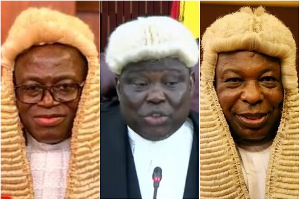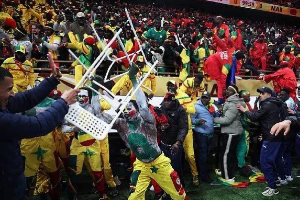Opinions of Monday, 23 September 2013
Columnist: Nyarko, Stallone
How to rig elections in Ghana.
Case study; election 2012.
1. Get access to the excess results sheets (Pink sheets) the E.C prints.
2. Now create results for non-existing polling stations with their names and codes similar to some original polling stations and by colluding with Presiding and returning officers, smuggle these results into the constituency tally at the collation centers.
3. Take copies of results from your agents after the close of poll and manufacture new results to look like the originals but increase the votes of your candidate especially in polling stations where he lost by a big margin. Now see; this was why some of the pink sheets had total votes cast exceeding the number of ballots issued at the stations as captured in the over vote category of petitioners. Here you collude with Presiding officers, compromised/unsuspecting returning officers and compromised agents of their opponents. Note ; This system was highly possible in constituencies where it takes more than a day to finish the collation exercise. Mind you the results sheets (Pink sheet) is not put and sealed in the ballot box like it happens to the ballot papers and other materials used after the close of poll. The Presiding Officer takes the pink sheets to the collation center and has custody of the pink sheets through out the period after the election. This is where a very fertile ground for manipulation and swapping of pink sheets is provided. Note that, in most cases, counting agents of the parties at the collation center do not have the complete set of pink sheets covering all polling stations in the constituency at the time the returning officer starts entries on the collation form. Note here again; The collation sheets are not given to parties after the close of collation and declaration of constituency results . The counting agents of parties have no means of ascertaining the credibility of all figures on the collation sheet. Now see, a controversy will definitely arise where the party is able to get the full complement of 'ORIGINAL' pink sheets from all polling stations before the constituency collation ends. Here the party would be able to arrive at the 'ORIGINAL' results from the constituency which will definitely contradict the constituency results declared at the collation center which has fake and doctored pink sheets included in the tally.....The case in the DOME KWABENYA CONSTITUENCY.
Now Compare the Above with revelations made in the petition in court.
The E.C admits to have printed twice the number of pink sheets required with duplicate serial numbers. The excess of these pink sheets were in the custody of the E.C in various offices across the country.
1. It was unearthed that there were three polling station results for an area that officially had only two stations. E.g Finger of God Church polling Station. The Chairman of the commission told the court clearly that there were only two stations, A and B for the Finger of God church. It was however unearthed that there was a third result sheet (Pink sheet) with the name similar to the official polling station names at the Finger of God church with different results.
2. It was again unearthed in the course of the trial, instances where one polling station produced two different results(Pink sheets) with the same names and codes but completely different election figures. The response given by chairman of the commission that it was possible the double results might have resulted from special voting was clearly proven to be untrue when the petitioners provided the exact locations of special voting which were different from the polling stations in question.
3. All through out the trial the custodian of original results had not provided the originals of these documents to counter the claims of the petitioners. The very moment the commission provided 17 supposed 'ORIGINAL' pink sheets revealed stark and startling differences between the originals from commission and copies which were supposed to have come from the originals.
The author of this piece is not a lawyer but was a counting agent at a collation centre during the last election. The views expressed here are from my experience in the election and revelations in court. It has no intent impugning the verdict of the court on the petition but seeks to show a clear possibility from our electoral system. The shouts for electoral reforms should not concentrate on effecting only glaring changes to the system but reforms should affect very basic and ostensibly ‘trivial’ aspects of the electoral process.














